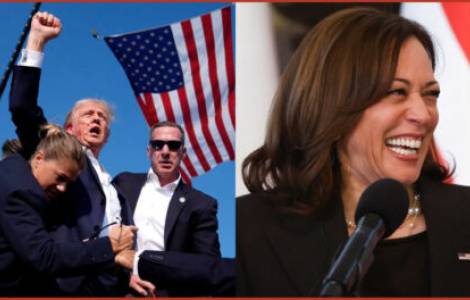
Washington (Agenzia Fides) - The war in the Middle East has entered the race for the White House especially in those States like Michigan where there is a large percentage of the population of Arab origin (Palestinian, Lebanese and Iraqi in particular).
Foreign policy is not traditionally among the key factors that guide the US electorate's choices inside the ballot box. Nonetheless, the outcome of the US presidential election (voting takes place on Tuesday 5 November) is bound to have a significant impact on the tensions that cross the global geopolitical scenarios and the wars that bloody the world.
The Democratic candidate is in a difficult position because she is part of the current administration that granted at least $18 billion in military aid to Israel after the attack unleashed by Hamas on 7 October 2023, fuelling criticism from those who see America as complicit in the massacres committed against civilians in Gaza. Kamala Harris has not been spared criticism from the more left-wing part of her party and the Arab electorate, despite being as Vice-President one of the first people in the Biden administration to call for an ‘immediate ceasefire’, and to express concern about the ‘humanitarian catastrophe for the Palestinians’ urging Israel to end the conflict. However, she did not support an arms embargo against Israel, which some on the US left would like. At the party convention, she said she would ‘always stand up for Israel's right to defend itself’.
In her support, the 2016 nominee of the most left-wing part of the Democratic Party, Bernie Sanders recently promised his supporters: ‘I promise you, after Kamala wins, we will together do everything that we can to change US policy toward Netanyahu’.
But the Democratic candidate aroused the ire of the Arab-origin electorate when she received the endorsement of Liz Cheney, daughter of Goerge W. Bush's former vice-president Dick Cheney, who is considered a hawk who promoted the invasion of Iraq in 2003 and is not well regarded by Americans of Iraqi origin.
Donald Trump did not miss the opportunity to ridicule in the eyes of the electorate of Arab origin the proximity offered by the former Republican congresswoman to the Democratic candidate, saying: ‘Liz Cheney, who, like her father, the man that pushed Bush to ridiculously go to War in the Middle East, also wants to go to War with every Muslim Country known to mankind’. Trump for his part has to make amends for inflammatory statements towards Arabs and Muslims, especially with regard to immigration to the US, but he is now trying to get closer to the Arab electorate (and more generally those who are critical of the war in Gaza) by promising to be the one who will bring peace back to the Middle East and Ukraine. ‘If Kamala gets four more years, the Middle East will spend the next four decades going up in flames, and your kids will be going off to War, maybe even a Third World War, something that will never happen with President Donald J. Trump in charge,’ he said. But beyond rhetorical proclamations what is Trump's position on the Middle East? Trump has repeatedly stated that the war between Israel and Hamas would never have broken out had he been in power, although he has offered few details on how he would have handled the situation differently from Biden. During his time in office, he promoted the so-called Abraham Accords that led to the opening of diplomatic relations between Israel and a number of Arab states (the UAE, Bahrain, Morocco and Sudan) and with the prospect of reaching a regional understanding extended to Saudi Arabia, the other pillar of American policy in the Middle East. The aim was to create a regional security system centred on Israel and Saudi Arabia of which the US would act as external guarantor, allowing it to withdraw some of its troops deployed in the area.
The logic behind the Abraham Accords was explained by Trump's vice presidential candidate, JD Vance. ‘America doesn't have to constantly police every region of the world,’ he said in a television interview. ‘We should empower people to police their own regions of the world.’ Vance while recognizing Israel's right to defend itself stated that a war with Iran is not in the US interest.
The Abraham Accords, however, do not offer a real solution to the Palestinian issue even though Trump in early 2020 had proposed an American-funded Israeli-Palestinian peace plan aimed at making Gaza an international tourism hub. The Trump administration had also recognized Jerusalem as the capital of Israel where it had transferred the embassy from Tel Aviv and closed the US consulate in East Jerusalem that mainly served Palestinians. (L.M.) (Agenzia Fides, 31/10/2024)